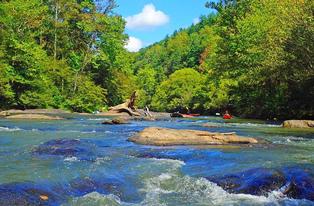FRACKING IN THE DAN RIVER VALLEY?
August 4, 2014
August 25, 2014
Time: 5:00PM-9:00PM
The Mining and Energy Commission (MEC) mission is to establish safety rules for fracking, not to determine whether there should be fracking in North Carolina. Therefore, when you speak at the public hearing, you need to speak to issues that they are responsible for, not against fracking in general. You should be concise and on target.
Since most of us have not followed the MEC activities closely, we are providing the following talking points. Pick one issue that you are most concerned about and speak from the heart. (Each person will have only three minutes to speak.)
Property rights—forced pooling: Gas can be taken from your property without your consent. Forced pooling occurs when an individual is forced into a commercial gas production unit. In 2013, the MEC voted to allow gas companies to force people into selling gas under their land if enough of the landowners around them want to form a drilling unit and sell their mineral rights. This leaves you no right to know what chemicals are being pumped into the ground below your property. The MEC has yet to define a drilling unit (number of landowners, number of acres, or what percentage of those in the unit that will have to want to sell to force the others into fracking.)
Property rights – split estates: If you live on a split estate (where the mineral rights have been severed from the property rights) you are even more vulnerable because someone else can dictate how your land is used. A mineral estate has an implied easement to use the surface in any way that is reasonably necessary for the exploration, drilling, production, transportation and marketing of minerals including natural gas. With that comes the right to choose drill site, construct roads or other infrastructure, cut trees and use ground and surface water.
There are currently no protections for landowners such as requirements for surface use agreements, indemnification of landowners (releasing landowner from liability for disturbances the gas company makes), or mortgage and insurance assistance to the landowner.
Baseline well testing: In 2012, legislation made drillers presumptively liable for contamination of groundwater wells within 5,000 feet of a gas well. This distance has been reduced to 2,650 feet. With horizontal well lines extending over 5,000 feet in some cases, 2,650 feet does not even cover the well perimeter.
Loss of local control: Current law preempts all local ordinances that would impede shale gas development, such as restricting a gas company from a particular area (school, church, cemetery). It also prohibits local governments from levying taxes or fees to recoup expenses caused by gas development such as road repair or increased law enforcement.
Set-backs: Set-backs (the minimum distance a gas well can be to a structure or well) are 650 feet from a dwelling, a water well, or a high-occupancy facility like a school or nursing home. The MEC can allow the set-back to a home to be reduced to 400 feet. These are very close distances when you consider the gas wells create a tremendous amount of noise, air pollution, vibration, and threaten ground and surface water.
(Thank you to No Fracking in Stokes County for content)












